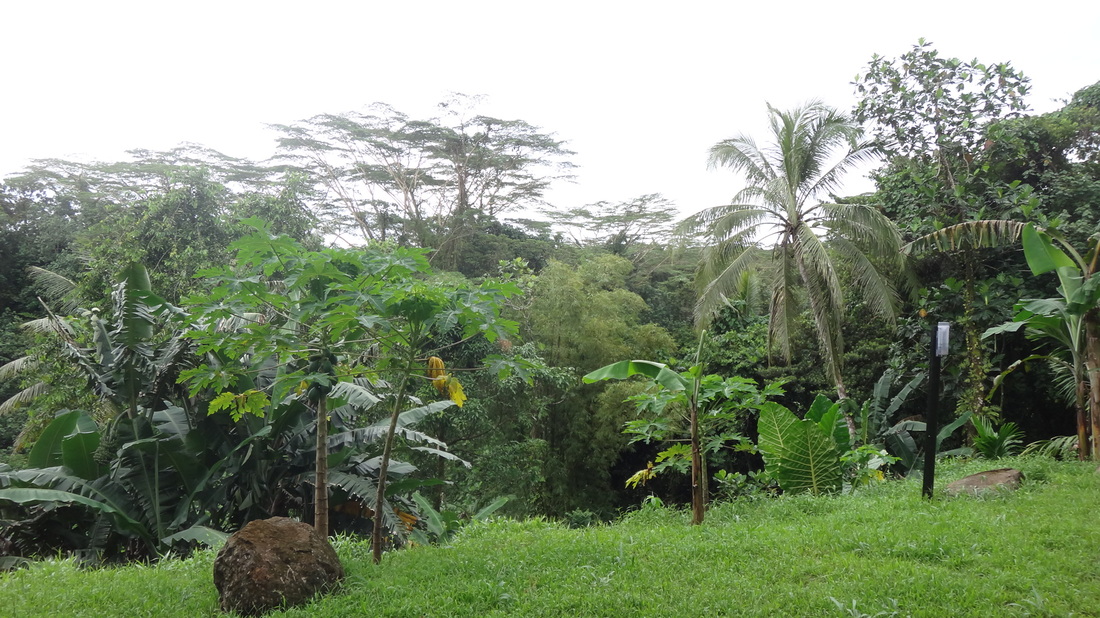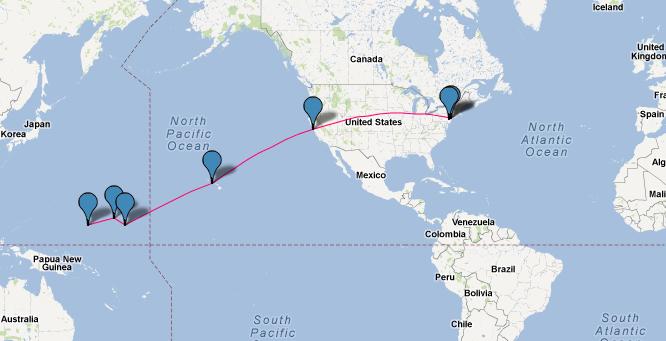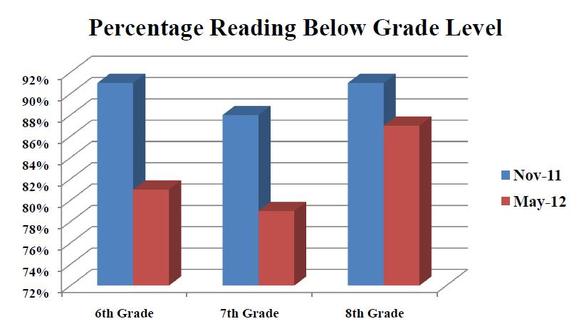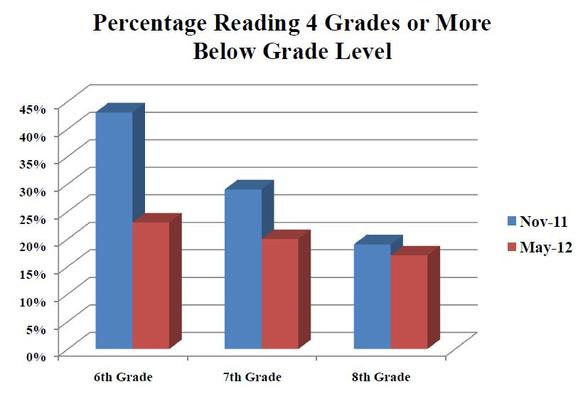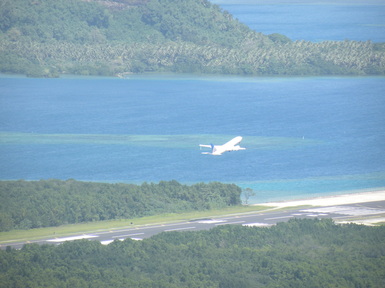 Shot from Sokehs Ridge of liftoff at Pohnpei International Airport Quick disclaimer: this post is going to involve a fair amount of cheese, so you might want to go get some wine and crackers. Bad joke, my apologies. Anyways --- I can’t believe it, but the day is finally here for me to say goodbye to these islands, at least for now. The past few weeks I have been asked often how I feel about leaving. The best and only word to describe it is bittersweet. While I am very excited to see family and friends, and I’m not exactly dreading taking my first hot shower in eight months or watching the Yankees, there are so many things that I am going to miss about Pohnpei.
For starters, look at my backyard:
How do you beat that? I truly have been aesthetically spoiled here. Every day I get to see postcard views – a privilege I have tried not to take for granted. More than just the images associated with an “island paradise,” I’m going to miss the work I have been doing here. Despite the challenges, (if you have read a word of my blog you know what I’m referring to) it has been extraordinarily rewarding work. Working every day alongside others with a shared purpose has been truly awesome, in every sense of the word. Quick side note: our iPad grant has become official – so a major Pohnpeian “Kalanghan” (Thank You) to AUSTRALIA!!! Thanks to the folks down under, MAHI International has received a grant for a little over $20,000 to purchase 40 iPads and rugged carrying cases! I’m also going to miss the slower pace here and the more relaxed approach to life. While there are some negatives to “island time,” it has been gratifying to escape the high-stress world that spawned the 24/7 news cycle. You would be amazed how simple life can be, and how much easier it is to connect with yourself and others, when you aren’t constantly distracted by the bells and whistles of modern America. As I mentioned in my last post, I am going to miss the incredible randomness of Pohnpei. Every day is an adventure where I might witness something I have never seen before. Pohnpei comes with many surprises, both good and bad. It wasn’t always fun when the power went out for hours, but where else in the world can you see a four-door sedan raking a softball field? I think American culture has indoctrinated most people to love routine – no one likes change of any sort. Just think of how the general public reacts when a road is shut down for construction or if the Facebook format is altered. People flip. I have learned here more patience than I thought was humanly possible and with that the mentality to just roll with the punches. There are gems in the unexpected, not just headaches. More than anything though, by a long shot, what I am going to miss most about Pohnpei is the people. The friendships and mentors I have gained here have truly been life-changing. I can’t put into words how blessed I feel to have had the opportunity to work alongside with people like John, Mr. B and many others. This island will forever be linked with these people and for that Pohnpei will always have a special place in my heart. I have no idea who reads this blog, but I’ve accumulated a sizable following somehow. While I don’t know who you are, I want to take a moment and encourage anyone reading this to take the opportunity to get out and serve. And if at all possible, get out of your comfort zone. I of course would recommend MAHI International as a great organization to volunteer for. Currently we are looking for more English instructors to expand our program next year! This has been one of the most challenging, but also one of the most rewarding experiences in my life. Whether you can make it out to Pohnpei or not, get off the couch and go do something. I guarantee you won’t regret it. This experience has been an adventure. It really is difficult to put everything into perspective at the moment. I’m sure though that I will look back at my time in Micronesia with fond memories, recalling the joys, the trials, everything I learned, our successful program, and most importantly the people that made this tiny island in the Pacific my second home. So Pohnpei, Kalanghan and Senek Pwurodo! (Till I see you again!) Drew P.S. Despite my leaving Pohnpei, I still plan to keep this blog going for at least another month or so. In my reading of different long-term volunteer abroad blogs before I came to Pohnpei, I couldn’t find one that talked about reverse culture shock and re-adapting to one’s former world. I also have learned from past trips and experiences that most of the time you learn the most from a trip or experience not during that period of time, but after. I look forward to learning more and sharing what I have learned in the weeks ahead once I am back in part of the world that most people actually knows exists! Also, I have been asked many times, “What’s next?” I have an answer and I’ll leave that to a future post. For those of you who STILL need reminding of where the heck Pohnpei is, check out this map of my flight home. The island hopper plane will be making stops in Kwajalein and Majuro before crossing the International Dateline heading to Honolulu. After a few hour layover it's to San Francisco, before finally the last leg across the country to the best state in the union, New Jersey (stop laughing). In total, I will be traveling 8233 miles in 24 hours. 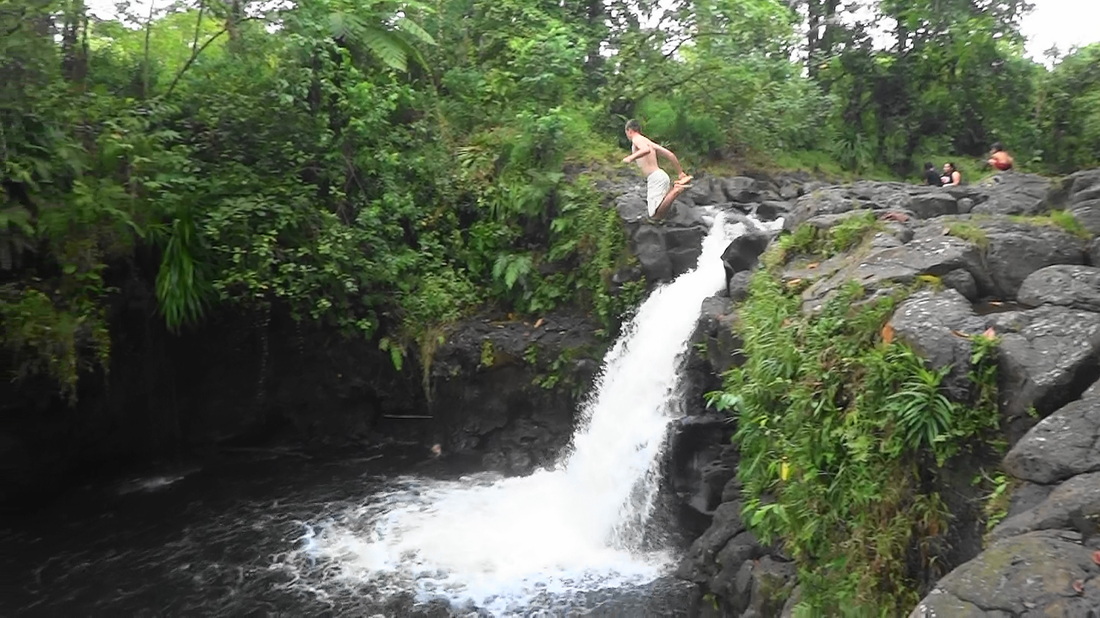 One last waterfall jump (for now!) 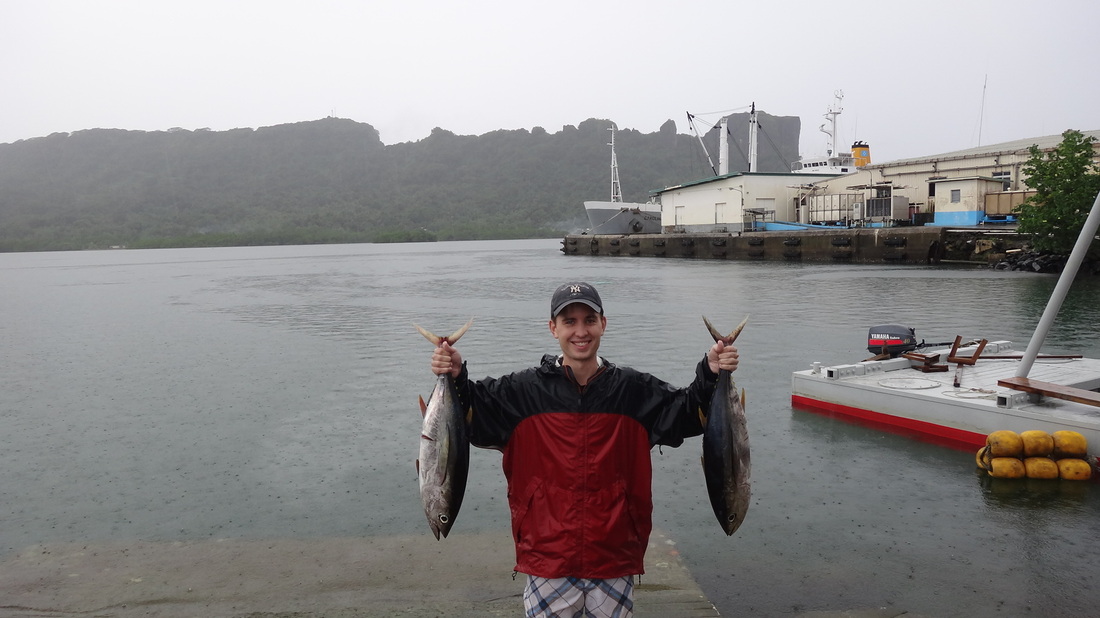 My last day on Pohnpei was a wet one! The series of events went like this out on the ocean: dry heave, vomit, pull a fish, vomit, pull a fish, repeat! I usually don't get seasick but it was worth it! Here's me with a couple of good sized Yellowfin Tuna.
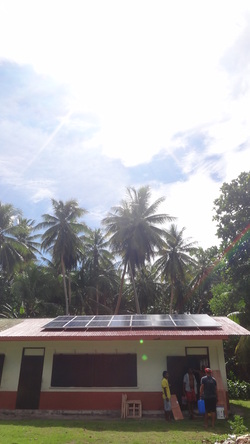 Completed solar panel unit on Pakin Atoll __ This time last year I was graduating from college, reflecting on how much I had learned and grown over the previous four years. I was still hearing people say “Microwhat?” when introducing my plans for the future, but I was excited for my next adventure. A long summer later and I was in Pohnpei. It hasn’t really sunk in yet, but I only have a little over a week left in Pohnpei. While reality will soon smack me in the face, I have been reflecting again on how much I have learned and grown over the past year. In the midst of this reflection, I realized that in a way, I’m “graduating” from Pohnpei. Let me explain. When I first talked to John, the Executive Director of MAHI International, about volunteering in Pohnpei, I was first introduced to the solar project on Pakin Atoll, an outer island approximately 30 miles from Pohnpei. I researched grants and started fundraising for the project, excited at the prospect of transforming the life of the residents of Pakin, who have never lived with power on their island. While things changed and I shifted my focus to education here on Pohnpei, I was always excited at the prospect of contributing to this project in any way I could. I’m happy to report this past week we installed 16 solar panel units on the school roof in Pakin! This power will be used primarily for an ice machine and freezer which will revolutionize the economy of the island as the main source of income is fishing. There is a lot of extra power as well which is exciting as it might lead to future projects such as a computer lab for the school. On Pakin I also had the chance to help with health screenings of the islanders, assisting Ben, a doctor who is volunteering for MAHI International. There are about 60 people living on Pakin, a number which inflates during the summer months when high school students return from Pohnpei. We screened 40 adults and were able to educate them about many health issues about everything from quitting smoking to diabetes. Life on Pakin is a different world. One thing is for sure, most of my city friends wouldn’t be too comfortable. There are more pigs than people, no running water, and if you want to eat dinner it’s a plate of rice unless you get in the ocean and catch a fish. Many people see pictures of places this and wish they could live on a beautiful island paradise. While it is absolutely gorgeous many overlook how tough island life actually is. I have a tremendous amount of respect for these people on the outer islands and their incredible toughness. Once we got back from Pakin it was back to the grind. I was really excited for Friday morning when we had a meeting with an embassy here regarding a certain grant application. Back in December I wrote a grant to receive 16 iPads for our education program. We heard very positive feedback from this embassy after a long delay and re-writing the grant for 40 iPads, with the assistance of Ap, the Peace Corps volunteer on Pakin. We were a little worried however when they asked to meet regarding our application. We were able to get our hands on an iPad on island and showed them an application we plan to use and answered all their concerns. The grant was re-submitted with the very minor additions and the grant is all but set in stone (as it isn’t set in stone, I have not mentioned the embassy – once it is I will heap praise on their awesome nation!). When John, Ap, and I walked out of the meeting, it was then I started thinking about how I’m “graduating” from Pohnpei. We have worked tirelessly to receive these iPads and it’s becoming a reality! Any college student, past or present, can recall the intense satisfaction one feels after submitting all their work or finishing that last exam to finish a school year. I felt a similar feeling when we realized the iPads are actually coming – a long period (over a semester long this time!) of work, dedication, and persistence culminating in a moment of where we could revel in our achievement. These iPads aren’t the final answer – there is no silver bullet – but this tool will be an incredible addition to our education program. Speaking of graduation, this is our last week in the schools. While I’m sad to leave our students I’m very pleased with the progress made this year, especially amidst our limited resources. As I reflect on all that MAHI International has accomplished during my time here, I will be very proud of the solar project on Pakin and our acquisition of the iPads, but I will be most proud of our student’s increased English proficiency. I’ll let the graphs below speak for themselves. In the fun department throughout this past week, my roommate Ian and I were able to snorkel on the reef next to Pakin. No picture or video could capture the beauty of this place. You snorkel in water about five feet deep along the reef, then boom! – a drop down into the ocean so far you can’t see the bottom. The blue is the most vivid color I have ever seen and there are fish with the most vibrant and striking colors swimming everywhere. I felt like I was in an aquarium. I know what most mothers, including my own, are thinking at this point – where are the sharks?!? Yes, we stumbled across some. When there was just one shark, maybe four feet or so long, it caught our attention but we were more interested in observing it than feeling any sense of fear. When there was two of them we backed off a little bit, but continued about our merry snorkeling way. When the third shark showed up, this time maybe five feet, we stopped moving around and decided to stop diving down for the time being. Only a little bit later when the fourth and decidedly biggest shark arrived it was time to take a break and hang out on the reef! I might be willing to take some risks by entering shark infested waters, but I’m not crazy! This past weekend I was also able to visit Kepirohi Waterfall, which is likely the most breathtaking waterfall I’ve seen on Pohnpei just from the sheer size of it (pictures and video below!). While you can’t jump off it due to the lack of depth at the bottom, there is a place you can sit underneath the falls. It was incredibly loud but really fun to be on the other side of the tumbling water. It was also especially beautiful thanks to the 6.5” of rain we received in one day (5/18) a couple days prior. Just FYI – my next post I have been working on since the day I arrived on Pohnpei. You won’t want to miss it!
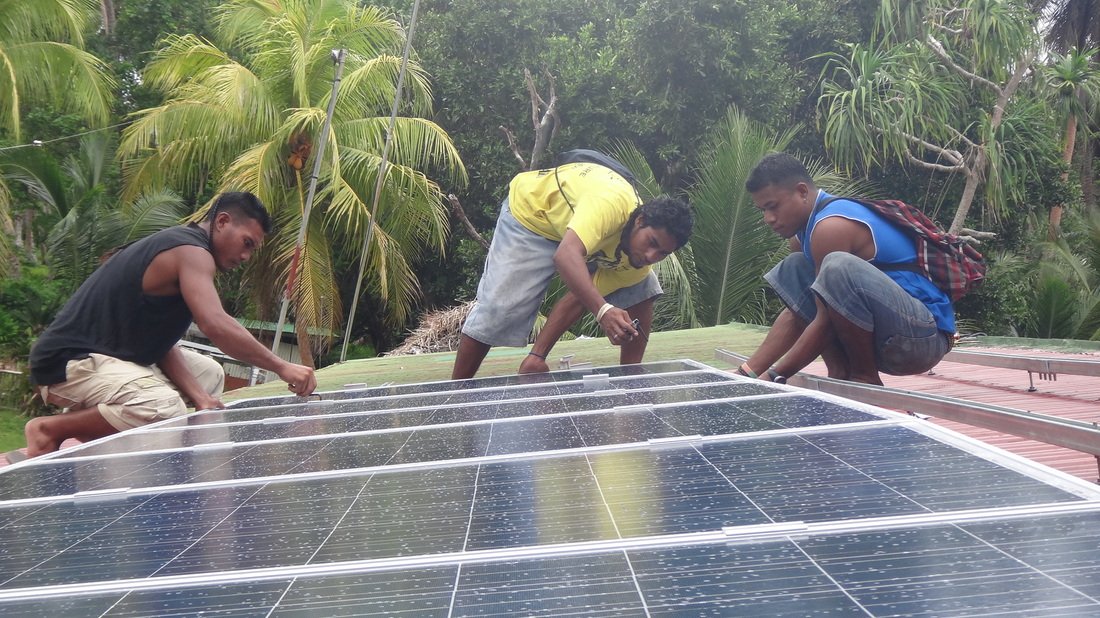 Locals helping install solar panels on Pakin Atoll 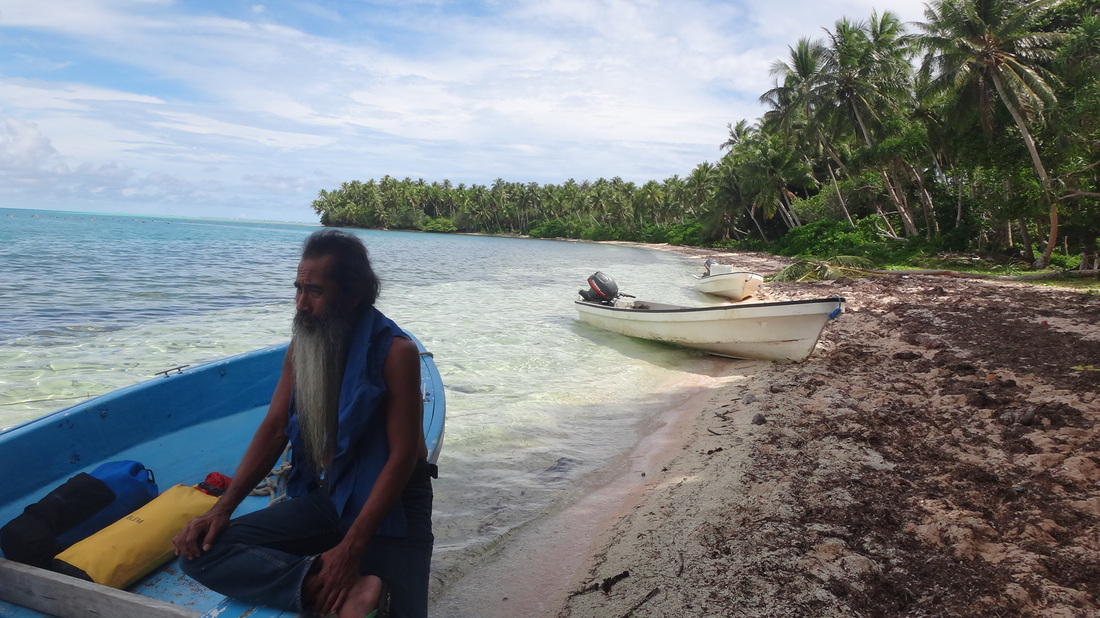 Pakin man with an epic beard looking out over the lagoon 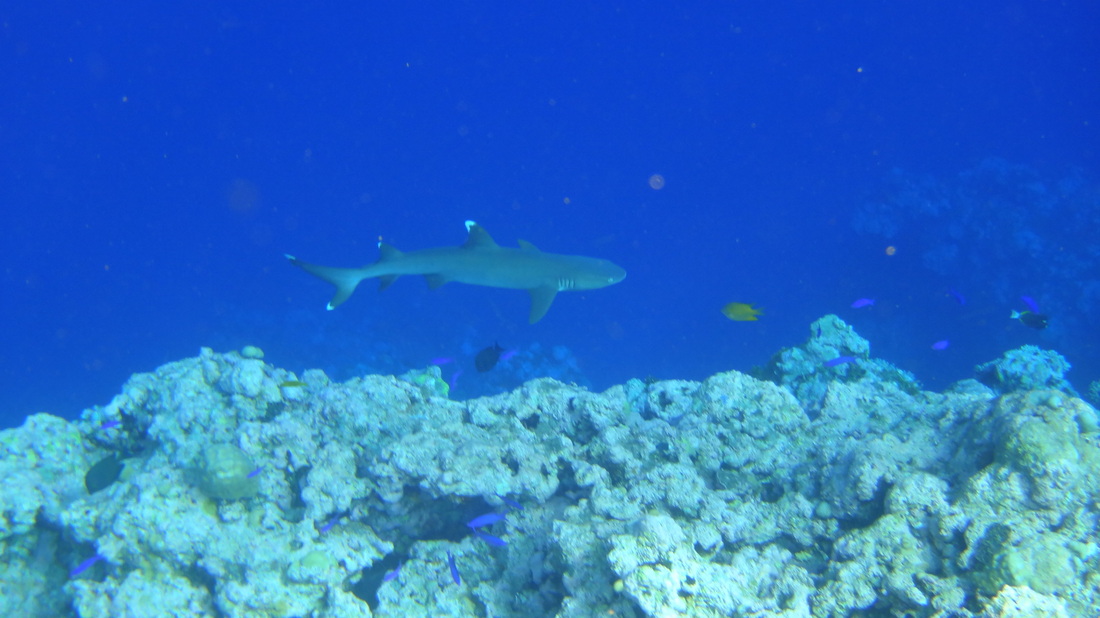 Hello there, friend 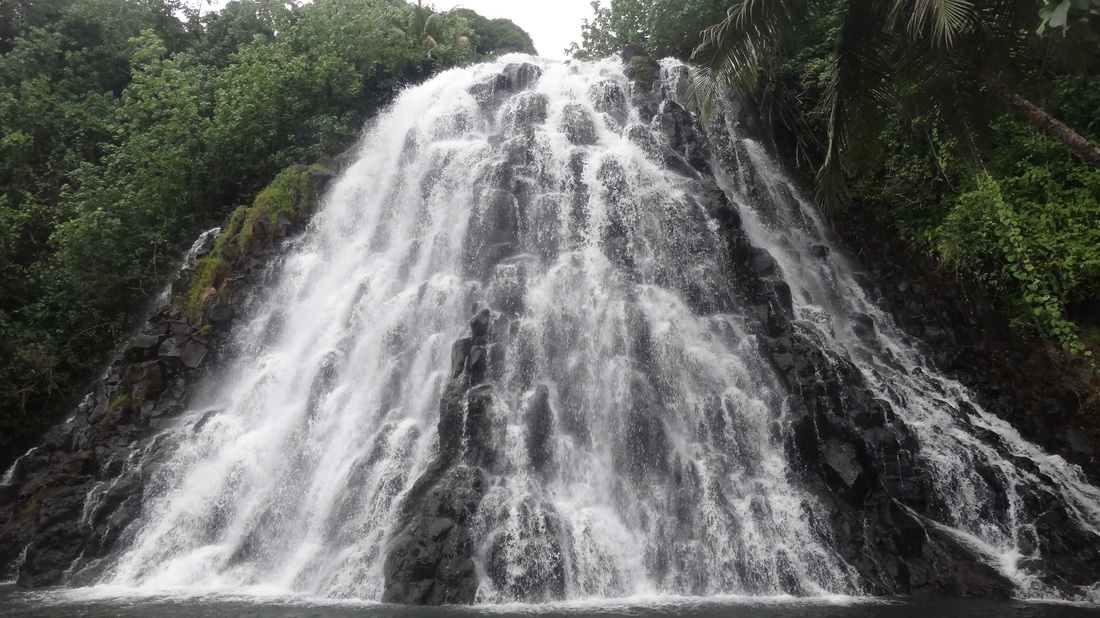 Picturesque Kepirohi (pronounced Kep-roy) Waterfall 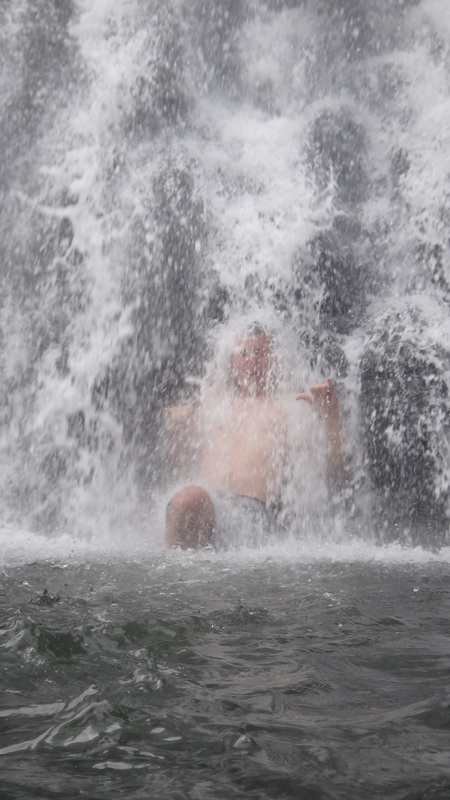 Can you see me under there?
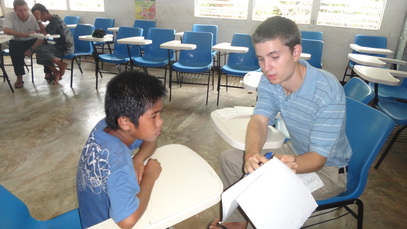 My roommate Ian and I conducting student reading level assessments _ One of the many reasons I came to Pohnpei was to learn more about service. I wanted to learn what service is all about – what motivates people to serve, how to successfully serve others, and what role service should have in my life. While I still have plenty to learn, my time in Pohnpei has left an indelible mark on how I define service. I was introduced to service at a young age through scouting. In Boy Scouts I mostly did things like clean up roads and hiking trails and collect cans for food pantries. Throughout college I was too busy most of the time for service. I regret not making time for it, but I did have the opportunity to travel to New Orleans and work on building houses for a week over spring break my senior year. These experiences left me mostly confused about service. I knew that it was a “good” thing to do, and while I enjoyed helping others I felt that I really didn’t understand service. I can’t really put my finger on exactly why – I just knew I was missing something. This left a nagging feeling inside me. I had the inkling to work with MAHI International ever since I met my good friend Alex freshman year, who introduced me to the organization. After spending eight months in the “real world,” working at two internships in Washington, DC over my Junior year and ensuing summer, I knew that I wanted to delay entering the workforce for a year. I had been in conversations with John, the Executive Director of MAHI International, since my sophomore year and my inkling to serve turned into a commitment. Everyone has heard the extremely true cliché that you learn more by experiences than in a classroom. I knew that coming to serve here in Pohnpei would be a memorable and valuable learning experience. Boy, was I right! At first, serving here didn’t feel any different than normal work. I had a job to do and I strove to do it well like always. After about a month though, I really started to learn what service is all about. As I have detailed extensively throughout this blog, working in Pohnpei is not without obstacles (big understatement there). I found these never ending roadblocks were especially frustrating when serving. Our mission is to make a difference and to ultimately help the people. When your opportunity to succeed is impeded it’s frustrating no matter what the circumstance, but is especially so when you are investing your time, energy, resources and heart into a mission. While I found the roadblocks frustrating, what drove me most crazy was the overall lack of urgency rampant throughout the island. Many times I felt like I was running through quicksand. Throughout this learning experience I really looked up to those who have dedicated their life to serving here. I leaned on bits of wisdom, like “making things funny” from Mr. B and spent hours talking with John also trying to access all the wisdom he has accrued throughout his time here. One conversation in particular though sticks out and I will never forget. In early December Mr. B and I were eating lunch between our visits to the schools. We have spent a ton of time together in all our drives around the island and I have enjoyed immensely hearing all of his stories and learning from him. A little background – Mr. B has been involved in education on Pohnpei for 35+ years, with 19 of those years as the principal of the SDA School. Mr. B is also by far the most selfless person I have ever met. I really wanted to get at the heart of what drove him to work so hard when facing so many challenges in attempts to grasp how to cultivate servant leadership in others. His answer was deep, eloquent, and shockingly simple – you love. I don’t want to get all cheesy but this really hit home. Most people just talk about their work and accomplishments. You can talk a big game but at the end of the day it’s all just hot air. Mr. B on the other hand is a doer. There’s something beautiful about hearing pure and utter truth spoken by someone who not only speaks it, but has lived it every day his whole life and still does. I can’t think of a better way to learn about service than working side by side with people like Mr. B who embody service in every sense of the word. So what is service all about? It’s about love. People who are truly motivated by loving others are the ones who make a difference as they are armed with the strength to overcome any obstacle. I can’t write about this without mentioning where this love comes from. MAHI International is a “Christian-driven” organization. Our work isn’t about evangelizing, but after spending so much time with the people who make up MAHI, it is crystal clear that our collective inspiration is coming from something greater than ourselves. While no one here is Jesus, it has been awesome to be around people so impacted by their faith and knowing Christ in their heart that Jesus seeps through them. After I leave these islands I intend to continue serving. Sure, this will mean doing typical “service” things like volunteer work. After spending so long engulfed in service though, I hope to have opportunities to serve others every day through my daily interactions. While my time in these islands is coming to an end, everything I have learned, including the lifestyle of service I have adopted, will continue to guide me for the rest of my life. All that said, my time here is not over! This past week we were in the schools conducting student reading assessments in attempts to see their progress since we first assessed them in October and November. The results are not complete yet, but I’m happy to report that overall we have seen major progress! Also, I’m very excited that this coming week I’m going to the outer island of Pakin for a few days. Just for a point of reference, Pakin is about a two-hour boat ride from Pohnpei if the weather is good. The main mission is to install solar panels, but I’m also going to be helping with health screenings and teaching in the small school there. Life on the outer islands is a completely different world so I’m excited for the cultural experience. In the fun department, this past Thursday was FSM Constitutional day, so my roommate Stephane and I took the holiday to hike Sokehs Rock (the big rock in the banner on the top of this page) and camp there. It’s always a spectacular view up there and the sunset, night sky, and sunrise were well worth the trip. We were very fortunate to have a clear night – the horizon was so clear it was hard to distinguish the flashing lights of boats on the water from the stars in the sky. It was also nice we didn’t get rained on! A few pictures are posted below!
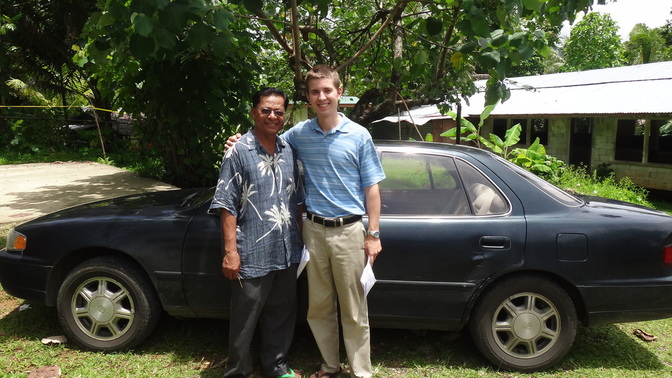 My favorite picture from Pohnpei so far - Mr. B and I standing in front of "the Green Machine" - i.e. the education program's car, used to take us from school to school 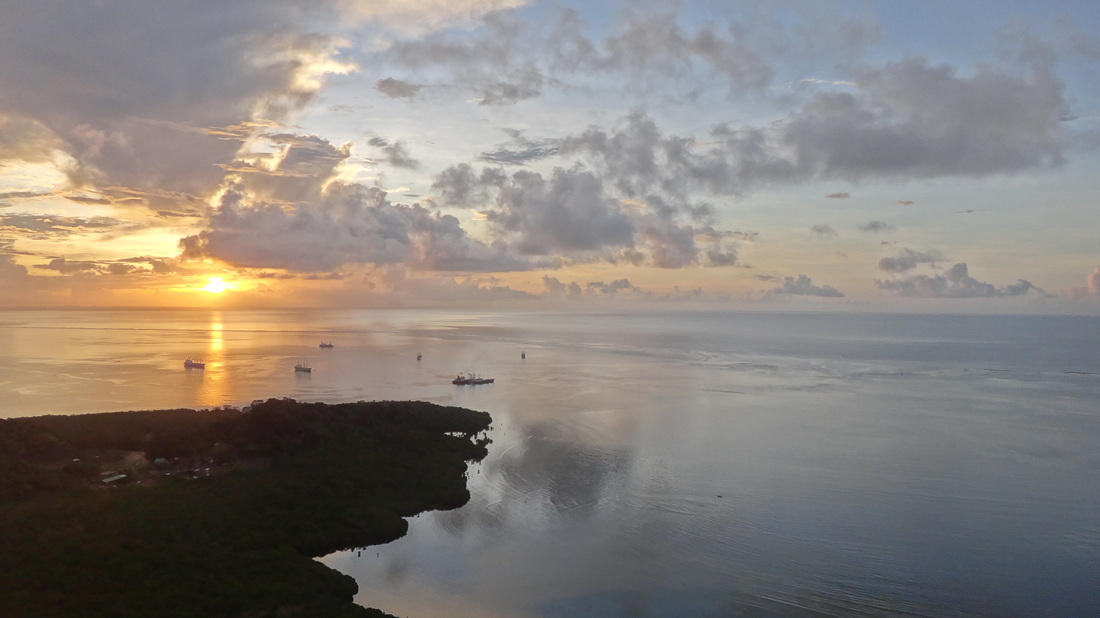 Sunset from atop Sokehs Rock 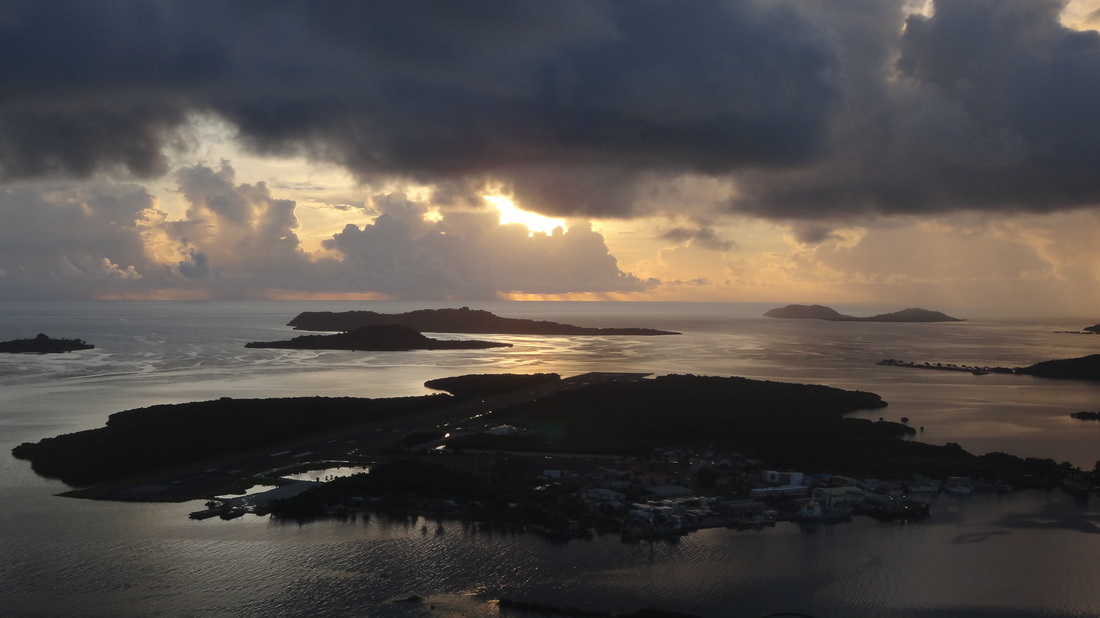 Good morning, Pohnpei International Airport!
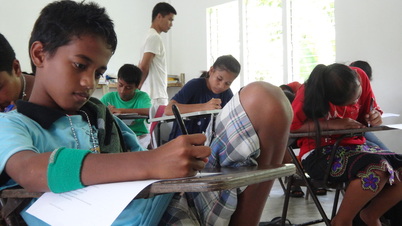 Students working on grammar worksheets at ESDM Elementary School _ It’s hard to believe, but we are winding up our education program for this school year. In the past few weeks we have focused on the 8th graders as they have their big high school entrance exam this coming Friday. We will spend another week working with our 6th and 7th graders before calling it a year. History shows that once you get to mid-May the schools here are pretty much checked out, infatuated with practicing for graduation ceremonies which are a huge deal. Picture the scene – spending weeks preparing for a ceremony to celebrate the accomplishments of graduating 8th graders – when many of them are reading at a 3rd grade level or below. Frustrate you a bit? Remember – if you don’t make things funny, you will get a heart attack. As we are approaching the end of our program this school year we have been reflecting on what went right, and what we want to do differently in the future. I’ll address the latter first. Originally, MAHI International planned to only have one or two schools in our program, focusing on truly making a difference there. When we brought our plan to the Department of Education last August, they implored us to take on seven schools, all of which were among the poorest performing and had new principals. After two months we dropped two schools due to a lack of support on their part for our program. When we gave our initial report on the state of the schools and the lackluster (to put it mildly) reading level amongst the students, we received negative feedback for dropping the two schools. The logic was “adding is positive and subtracting is negative.” We tried explaining how all we had was Mr. B, myself, a car, and a modest budget for fuel and copies. As a result, we argued it would be best for us to concentrate our resources to make a deeper impact. Some understood, some did not. About a month and a half ago, we dropped another one of our schools after a consistent lack of support. More than once we rolled up to the school and found no students there, and once we were in the middle of teaching and they rung the bell ending school for the day. Why? The principal had to go to class in the afternoon and the faculty meeting had to happen at 11:00. Here’s the logic – cancel school for 300+ students for the day, so one man can go to class later. Deep breaths now. Remember – make things funny. Believe it or not, that wasn’t the final straw. The school really needs our help so we kept trying, but after continued indifference from the school we had to sever ties. So here we are at four schools, all of which are spread across Pohnpei. While there is significant travel time (our farthest school is about a 75 minute drive through pothole ridden roads), we believe it is important to serve schools far away from Kolonia, as the Kolonia schools are the best and receive the most support. Even now however we are still having trouble with many of our school administrators and teachers not supporting the program. We have come to the conclusion that next year we will focus on two schools, and perhaps only one – choosing schools with principals who wholeheartedly support our program and teachers who see our instruction as an opportunity to learn new material and teaching techniques and not a 30-minute break. Beyond narrowing down our number of schools next year, we are excited at the prospect of receiving 40 iPads to use in the classroom. You might remember our original plan to bring iPads to use in the classroom this year. Without going into the details we applied for a grant to a very receptive organization back in December, and like everything in island life, have waited a long time. Long story short, the prospects are very bright that we will receive the iPads and three protective cases for them shortly! It’s obviously disappointing we weren’t able to use them in the schools this year but we can only move forward now. While I might not be here to witness it, I’m super excited to see pictures of our students with iPads in their hands! As I approach my last month on Pohnpei, I have been reflecting on all the work MAHI International has done as an organization around our education program this year – all the copies made, all the trips Mr. B and I took around the island, all the hours we spent imploring our students to speak in English, and yes, all the hairs we have collectively pulled out of our heads in frustration. I am now forced to ask the question – have we really made a difference? This is a tough question. I’m first forced to look at this analytically – what educational gains have our students made? I can unequivocally state that our program has resulted in widespread gains amongst our students. When we first asked students to write a complete sentence, the majority were dumbfounded. The idea of capitalizing the first letter in every sentence and ending it with a period was completely foreign. We then worked our way to the difference between proper nouns and common nouns, then present tense and past tense, and on and on. We still see sentences starting without a capitalized letter, and “cuz” instead of “because,” but they are now the exception, not the norm. Besides their writing, overall their reading comprehension has significantly progressed, along with their vocabulary and phonics skills. So analytically, the answer is yes, we have made a difference. But part of me wants to look deeper. It’s great that their English is better than it was a few months ago but there are still so many problems and so much room for progress. The question still stands – did we really make a difference? I was talking to my friend Ap a couple days ago, a tremendous Peace Corps volunteer serving on the outer island of Pakin. You might remember very early on in my fundraising last year I was raising money to put solar panels on Pakin. More on the progress of that project in the next post or two. Ap is a teacher at the school there and we got to talking about the progress our students have made. He said something I found very profound, and holds a lot of truth – at the end of the day, education is about faith. You have to believe in something that you can’t see – even if there doesn’t appear to be progress, education is a marathon, not a sprint. Mr. B joined us and reflected on his career in education. Thousands of students passed through his classroom and under his leadership as principal. He explained how he sees his students prospering all over Pohnpei, working in great jobs. He might not have been able to see his influence on graduation day (no matter how lavish the Pohnpeians made the ceremony), but he can undoubtedly see it now. (Although he would be much too humble to acknowledge he did anything extraordinary). Education isn’t like a business where there are indisputable, unambiguous numbers which reveal a company’s level of success. Sure, you can show an increase in test results, higher graduation rates and send more students to college. All of these are measurements of success which hold some validity. Ultimately however, the true impact of education extends far beyond numbers on a page. By entering these classrooms, exposing them to more English and encouraging them to read, work hard and aim higher, I believe we have truly made a difference. I gotta have faith in that.
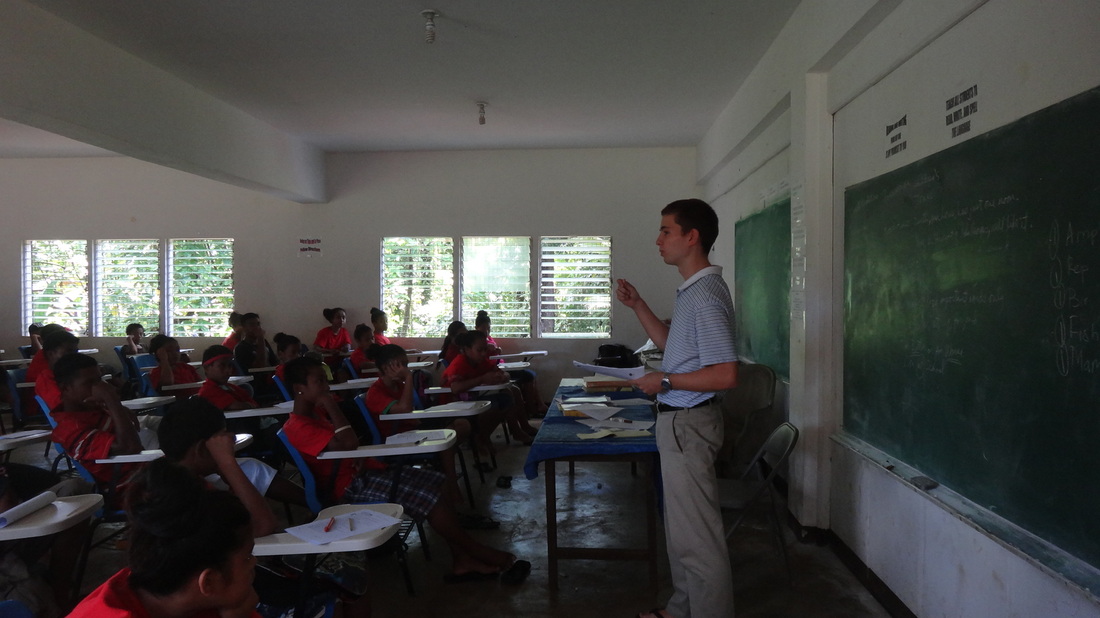
Teaching 8th Grade at Pohnlangas Elementary School
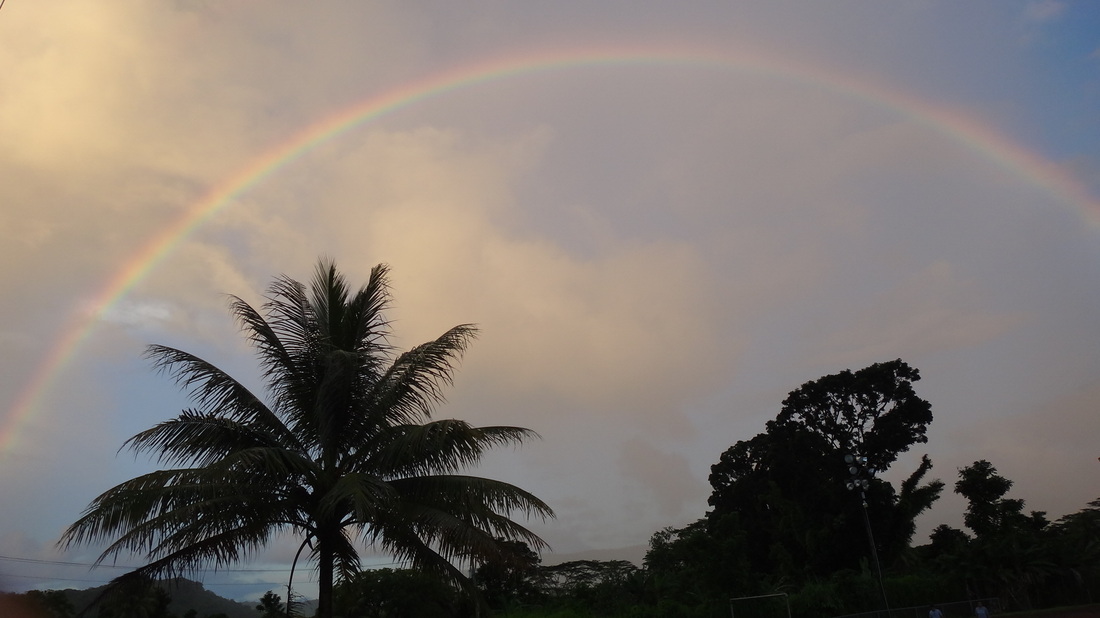
Recent Pohnpeian rainbow
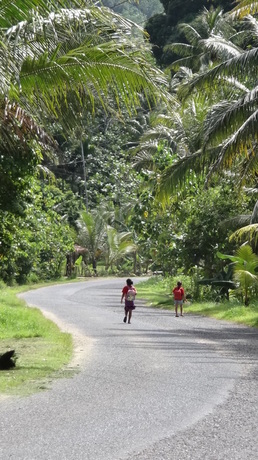 Throughout my time on Pohnpei I have witnessed a constant dynamic among the local people. While the western influence has pervaded into almost every aspect of society there are still elements of the original Pohnpeian culture. As I have mentioned before, many of these elements have been perverted by the western influence. A great example of this is sakau. Previously, sakau was a ceremonial drink that was only drank by the high traditional leaders on very special occasions. Now it is drank by over 70% of the islanders daily. This constant dynamic I speak of is how the islanders are “stuck in between.” They are Pohnpeians, which holds its own traditions and customs, but also have the western culture and its accompanying expectations forced upon them. How does one strike a balance between these two cultures? How do young Pohnpeians form their identity amidst all the confusion? There aren’t any easy answers to these questions and the lack of answers often leads to fatal consequences. Suicide rates in Micronesia, particularly for young adult males, are among the highest in the world. Even during my six months here, I have heard several tragic stories of young people taking their lives. This problem is far more complex than I could ever address in a short blog article. It’s worth noting though that suicide is a major issue in areas where the original culture has been taken away or perverted. Look no further than Native American reservations. In many ways, Micronesians are facing the same issues as the Native Americans – both struggle with alcoholism, drug abuse, suicide, unemployment and many other issues. While there are numerous factors that contribute to all the issues facing these indigenous people who have lost their culture, I believe that one of the largest causes is the loss of community. It’s a well-known fact that the modern western culture champions an individualistic narrative, while community is tossed to the side. In my opinion this is a troubling issue for all people, but is especially so for individuals whose entire culture revolves around the community. We really shouldn’t be surprised at these horrific consequences given what these people have been through. As I have mentioned before, I believe the easiest way to “fix” Pohnpei would be to shut down the airport and stop all the ships from carrying in cargo from the outside world. Pohnpei would be forced to go back to its original culture and while the transition would be tumultuous at times, I believe many of the issues facing Pohnpei today would slowly diminish until they were eliminated completely. However, this will likely never happen. Where do we go from here? Well that’s not an easy question and there are many things that need to be done to help these people cope with being stuck in between two different worlds. With our education program, we are helping hundreds of students with their English skills so they can pursue further education and hopefully return to their homeland and find modern-day answers to the issues present throughout these islands. The challenges facing indigenous communities are complex beyond our understanding. But while reform can only come from within, we as outsiders can help create the environment in which change is possible. This post was inspired by FSM Cultural Day which was this past Friday. I found it mind blowing to see people adopt one identity in these cultural dances, then watch them adopt another identity by hopping in their car and picking up some soda at a local store. A not-so-great video I took of one of the dances is posted below. If you're really interested there's a longer, well-done video someone did of the days events below that.
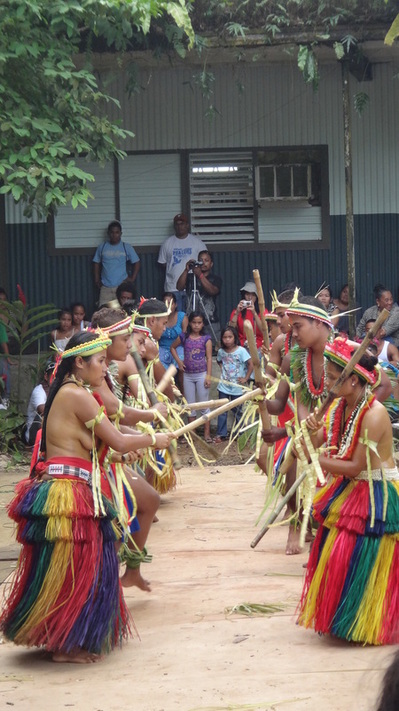 Now that's a lot of culture --- a Yapese dance on FSM Cultural Day 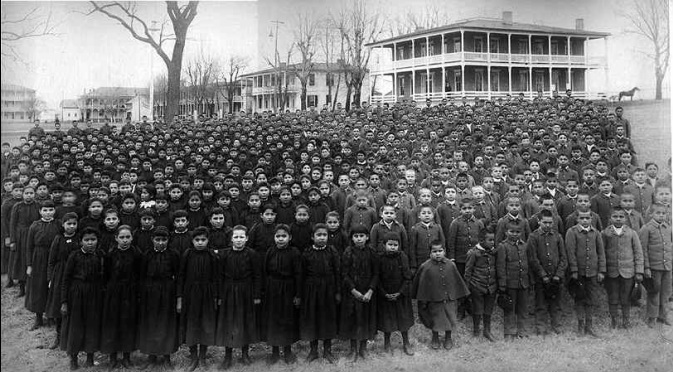 Talk about loss of culture - 1892, at the Carlisle Indian School, in Carlisle, PA  Recent panorama shot from atop Sokehs Rock
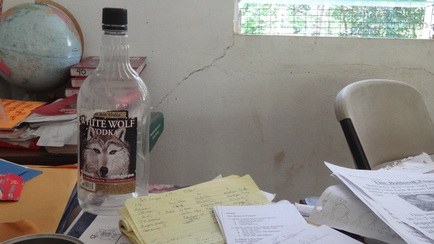 A teacher's desk. It's probably just water in there. Probably... _ I have written extensively of the many roadblocks and frustrations we encounter throughout our work here in Pohnpei, but trust me, I barely scratch the surface. I knew when I came here it wasn’t going to be easy and our collective perseverance and resolve would be tested. Of course though, knowing something in your head is entirely different than experiencing it firsthand. I remember the exact moment when all this hit home. Way back in October, a few weeks after I arrived, Mr. B and I were in a slight state of shock with just how bad the schools really are. We were sitting in the car about to leave from a school that had only one teacher for three grades. Most of the kids were sitting around or had gone home, even though it was only 11:00. Despite the negative circumstances Mr. B was often making jokes and laughing about the whole thing. I said while laughing along with him, “Mr. B, what are we going to do?!? Why are you laughing?!?” His response was priceless and classic Mr. B ---
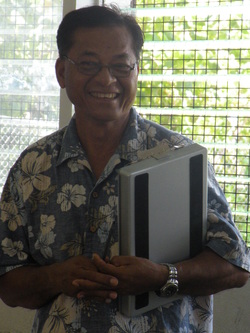 _
“If you do not make things funny, you will get heart attack.”
_While his response obviously made me laugh, there is so much truth to it. This attitude has served Mr. B extremely well throughout his life on Pohnpei working to help his people. Indeed, he very well might have had a heart attack by now if he didn’t have this approach!
Today we went to our largest adopted school which has six classes – two classes each for 6th, 7th and 8th grade. There were only three teachers and the principal wasn’t present. This left each teacher responsible for their 20 some kids, plus the 20 some other students. When the teachers are left with this predicament they stay with their class and give the other class a bunch of busy work a few times throughout the day. You can imagine how productive a group of 6th graders are when left alone to do busy work from a textbook. This happens all the time on Pohnpei – I have never heard of substitute teachers.
When we got to the 8th grade classroom, and saw that there was only one teacher for the two classes, I had to step outside the classroom and remember Mr. B’s wisdom. I had seen both 8th grade teachers earlier that morning, but one left for Kolonia during lunch. Heck, without any principal, who is there to enforce anything? It's worth noting that this is one of our better schools!
Despite all the frustration, I have learned, and rather quickly, that you can’t expect change to happen quickly, if at all. What I mean by this is that change can take years, even decades. In order to survive days like today, it is critical to have an even-keeled mindset. And it helps for personal health, when working in a place like Pohnpei, to take everything with a grain of salt, and if at all possible, laugh about the craziness.
There are countless lessons I’ll take with me when I leave this island, and this will be at the top of the list. We all encounter difficulties but if we can laugh about it and recognize how imperfect this world is and all the people in it, then we’ll be better for it. And less likely to get a heart attack. 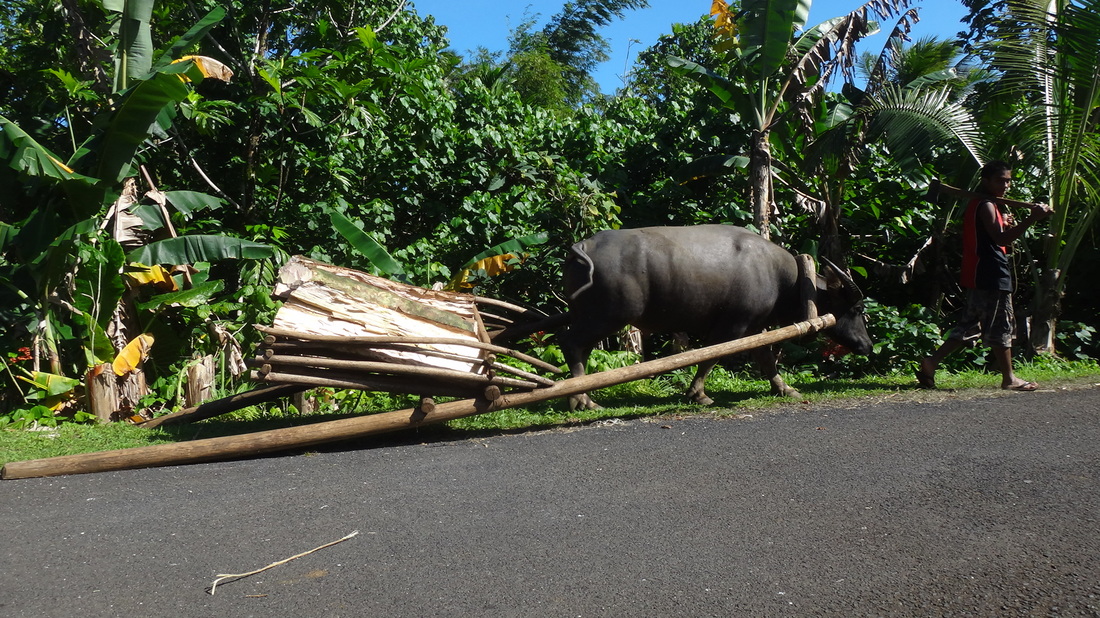 Just a normal scene witnessed on our drive back to town today 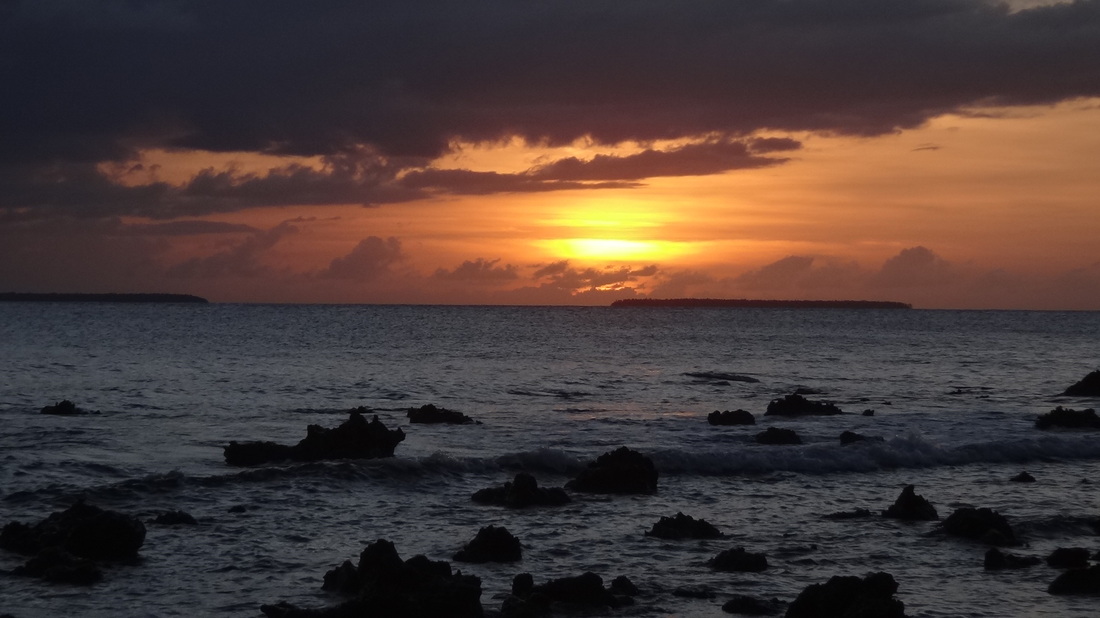 Sunset on the tiny island of Black Coral this past weekend, looking out to Ahnd Atoll
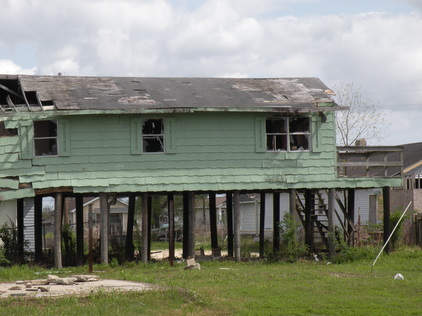 A devastated home in the lower 9th Ward - Six years after Katrina __ Last year at this time I spent spring break going on a service trip with my college to New Orleans, spending a week rebuilding homes. During the trip we kept a group journal which was later typed up and sent to everyone. I thought I would revisit the trip a year removed from the experience. The words I wrote jumped off the page. Before I explain why, here are a couple excerpts: March 13, 2011 Today during our large group reflection a common theme was the frustration over government inefficiency in solving the many problems presented in the city. Ultimately what it boils down to is the current state of the city, and particularly its education system, simply is not good enough. As a nation we need to hold ourselves to a higher standard – the wealthiest nation in the world should not have desolated communities such as the ones we saw today. While perhaps this is a bit idealistic, I am hopeful that we as a generation, and as engaged Dickinsonians, can work to improve these communities by attacking flawed, corrupt systems of oppression and implementing innovative and comprehensive policies to create lasting change. This is a broad idea in theory however, as it is abundantly clear that these problems are complex beyond our comprehension. I found myself dumbfounded today to see homes completely refurbished that would fit well into any normal neighborhood, surrounded by abandoned homes, clearly destroyed by the storm. While we all will learn a lot during our time here, I believe it is important to recognize that our understanding of the problems facing New Orleans and the effects of Hurricane Katrina will always be limited. We can hear survivor’s stories, see the destruction and experience the culture, but we will never be able to fully comprehend what this city and these people have gone through. It is with this approach of humility that I hope to attempt to grasp the infinitely complex problems presented, all the while doing my best to lend a helping hand. This week we will be making a small contribution to rebuilding New Orleans by repairing homes. However, I believe the lessons we all learn and the experiences we all have this week will lead to a changed mindset, forever reminding us of the desperate need for compassion and understanding in this world. March 17, 2011 A strong focus of this trip has been actively reflecting on our experiences. While I believe this is a valuable activity, something I have learned is how the most valuable reflections have come after much time has passed. It can take weeks, months, and even years to learn all the lessons from one specific trip or experience. I’m sure that my reflections of this trip will continue to grow and change as time distances itself from this moment. While New Orleans and Pohnpei are on the opposite ends of the globe, it has become abundantly clear that many of the problems facing these developing communities are the same. In my journal entry, along with many of the others written by my classmates, it was cited how frustrating it is to witness government inefficiency and lack of action. Well, if you thought American bureaucracy can be a headache, you haven’t been to Pohnpei! The fact that I then went on to specifically state how the “education system simply isn’t good enough” made me laugh considering what I have been doing the past five months. Looking at what I wrote, I see a fundamental shift in my approach to social change. Specifically, this sentence stood out: “While perhaps this is a bit idealistic, I am hopeful that we as a generation, and as engaged Dickinsonians, can work to improve these communities by attacking flawed, corrupt systems of oppression and implementing innovative and comprehensive policies to create lasting change.” I read this now and shudder. Even if you look back to my October and November posts, I used this type of language. Let's dissect it: It is well written, and uses several big words and phrases when it comes to social change like “systems of oppression,” “innovative and comprehensive,” and “lasting change.” I read it and it sounds very appealing – who wouldn’t want to attack “systems of oppression,” being “innovative” to create “lasting change?” Here’s my point: it’s all talk. When the rubber hits the road, big sentences like this might sound good, and maybe help people open their wallets to support whatever cause, but it doesn’t do anything. It’s not necessarily wrong to talk like this, but if it’s not supported with action, it doesn’t do anything but inflate the ego of the speaker. When it comes to social change, especially in developing communities, it is essential that the leaders are men and women of action. I’m really happy though that I followed up that “big” sentence with acknowledging that it is “abundantly clear that these problems are complex beyond our comprehension.” I knew when I went to New Orleans for only a week that I would not even start to slightly understand the problems that the communities there are facing. I thought however after spending five plus months on this tiny isolated island in the middle of the Pacific I would begin to grasp how to address the many problems on the island. Today I found myself saying, “The longer I stay here the more confused I get at how we can help this place.” I think that whenever attempting community reform we will find ourselves saying something similar to this. There are just so many factors – culture, government, race, education, history, religion – the list goes on and on. From New Orleans to Pohnpei, Somalia to Lima, Peru, Afghanistan to Sierra Leone, the difficulties in bringing “lasting change” to a developing community are vast and remarkably complex. There are no silver bullet solutions, despite how tempting it might be to search for them. I have become more and more convinced however, as evidenced in my last post, that when tackling any type of social change, the best and most effective approach is not attempting to reform a government policy or institution. Rather, it is to take an individual approach, working with the members of the community, learning how as an outsider you can best serve them in their efforts to better themselves and their community. This is a much less attractive approach – it doesn’t have the glitz and glamor of “fighting systems of oppression” and it certainly is much more difficult than finding the silver bullet solution. But in the end what’s most important? I look back a year ago in my week in NOLA with fond memories of friendships that were strengthened and created and being surrounded by like-minded peers who chose to attempt to grasp the complex problems of the world for a week rather than having fuzzy memories of a night on some beach. We left an indelible mark on the communities where we served, making them one step closer to recovery. We weren't working to reform vast institutions. Instead, we worked to help individuals, serving them the best way we knew how. As far as the future of New Orleans goes, I’m sure that most of us can look back at our time there and conclude that we learned a lot but ultimately left with more questions than answers. This struggle persists and always will. There is no utopia, no happily ever after. However, I have been taught by several individuals, and have come to believe, that there is always hope. I know this is cheesy but let me explain. I’m reading a biography on Abraham Lincoln, entitled “Team of Rivals: The Political Genius of Abraham Lincoln” by Doris Kearns Goodwin. In the book, Goodwin describes how Lincoln was “acutely aware of his own emotional needs,” finding rejuvenation and relief in several ways from the overwhelming burden of leading America through its most perilous years. Goodwin goes on to reference Daniel Goleman’s study on emotional intelligence which states, “Having hope means that one will not give in to overwhelming anxiety, a defeatist attitude, or depression in the face of difficult challenges or setbacks. [Hope is] more than the sunny view that everything will turn out all right, [it is] believing you have the will and the way to accomplish your goals” (631). Goodwin then writes, “More clearly than his colleagues, Lincoln understood that numerous setbacks were inevitable before the war could be brought to a close. Yet in the end, he firmly believed the North would prevail.” All those in the field of social change, especially those working in developing communities, could learn from Lincoln and his emotional intelligence. While there will inevitably be countless challenges and a never-ending stream of questions, if we have hope we are armed with the power to make a difference. And that is needed everywhere in the world, from New Orleans to Pohnpei.
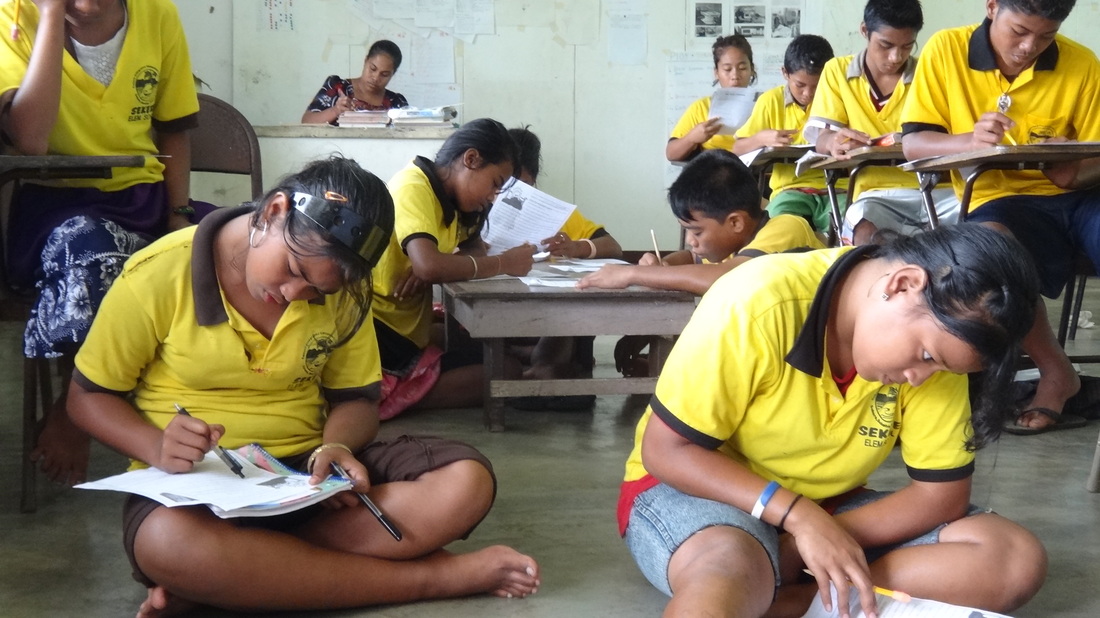 Students in an overcrowded classroom at Sekere Elementary working on reading comprehension worksheets
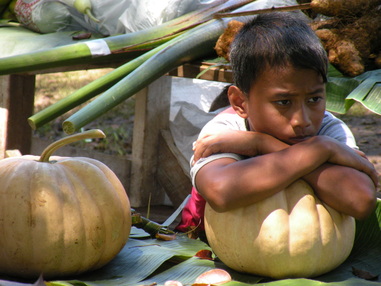 _ Way back in October I e-mailed my college president, Dr. William Durden, asking for any general advice in our education efforts here in Pohnpei. While he provided plenty of great advice the quote that stands out in my mind is “Reform must come from within and cannot be imposed.” I took this to heart and throughout our efforts to reform the education system on Pohnpei, I have been constantly searching for how we can motivate the students, teachers and administration to excel. We have informed the students of their extraordinary position of privilege, talked with teachers about their struggles and paths to improvement, and reported to administrators the severe deficiencies we have found in the classroom. Ultimately though, I’m still left wondering what we can do to encourage the majority of the locals to improve the education system. We can help in many ways but as Dr. Durden wisely noted, we can’t force motivation upon them. I have learned firsthand the need to understand a people before you can “change” them in any way, shape or form. You don’t have to go that far back in Pohnpeian history to see that their current lifestyle is vastly different from the past. Before the white man ever arrived on island, the Pohnpeians were largely living a very comfortable life. They didn’t work a 9-5 job, doing the same thing every day of the workweek. Instead, they were mostly sustenance farmers, living off the land. Pohnpei is known as the “Garden Island” of Micronesia. All three other states of the FSM, Yap, Chuuk and Kosrae, have more difficulties in growing food and have to worry about water collection. Food is abundant in Pohnpei and water is one of the least of their concerns. A few examples illustrating Pohnpei’s “Garden Island” title: - In November we were eating papayas here at the MAHI International Hospitality Center and tossed the seeds off the balcony. There are now ten papaya trees, the tallest being seven feet tall.
- Mr. B told me that the old canoes found in Pohnpei were not designed for the open ocean. The fish were so abundant inside the reef they didn’t need to go outside of it. The canoes found in Yap, Chuuk and Kosrae however were all designed for the open ocean.
- All throughout Pohnpei there is so much food that is waiting to be harvested. Everywhere there are Giant Taro patches, Breadfruit, Coconut, Banana and Papaya trees, and much more.
Living with such plentiful resources produced a unique lifestyle on Pohnpei. While they still had to work, the transition to the typical Western work life has been very difficult. Throughout our time in the schools I have asked every class if the students have been off the island before, and only a handful that were born off island answered yes. It’s worth noting that every time we have encountered a student who is clearly far ahead of their classmates, we have discovered they came from Guam or the US. Every student who was born on Pohnpei has never left. How are we supposed to motivate these students to excel in their education so they can go to college, if they have never been outside of this tiny island? What we’re ultimately trying to do here in Pohnpei is not just reform the education system, but influence the culture so that reform is possible. As Dr. Durden noted, our real challenge is “cultural resistance and cultural change.” How does one begin to change a culture? Is that a desirable goal in the first place? The fact is that much of Pohnpei’s culture has been lost due to the pervasive Western influence. Many of their traditions have not been completely lost, but perverted. A great example of this is sakau. Previously, sakau was a ceremonial drink that was only drank by the high traditional leaders on very special occasions. Now it is drank by over 70% of the islanders daily. It’s crystal clear that it is ridiculously difficult to reform a culture and the deeply entrenched institutions that lie therein. Given this, I have sought to influence individuals, believing that if even one student is positively impacted by my being here, my time will have been well spent. Institutions and certainly a culture are simply too large to tackle, especially in the short-term. While the vision of grand change might be admirable and worth seeking, at the end of the day what we’re seeking to change are individuals. Only the local people can shape their culture. Indeed, reform must come from within.
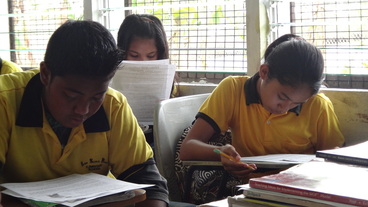 Students at Sokehs Pah Elementary _ I remember in college I would begin each semester imagining myself conducting a perfect academic symphony – reading all material twice, completing all assignments early, breezing through exams, and writing an amazing, well-researched final paper. While I did well in school, my symphony was never on the level of Mozart or Tchaikovsky. Indeed, once the semester got underway it was always harder than imagined to maintain momentum. Semester after semester I learned the same lesson. I know I’m not the only college student, past or present, who can identify with this story. When I came to Pohnpei I remembered the lesson. I still envisioned a symphony – working with principals and shaping them into better leaders, exposing teachers to new techniques, motivating students to commit themselves to their education – all in an effort to make a deep and lasting change on the education system in Pohnpei. This time though, I knew it wasn’t going to be a smooth ride. Right now we are in the thick of it. We are teaching in the schools every week, working to improve our program and building for the future. As you might have gathered through past posts, we face our fair share of obstacles every day here in Pohnpei. Several times we have pulled up to an empty school due to a funeral or an unfamiliar holiday. Perhaps our largest obstacle that I have hinted to in my previous two posts is the teachers’ lack of English skills (see picture below). Given obstacles like these, it’s not surprising that each of us has asked “Can we really make a difference here?”
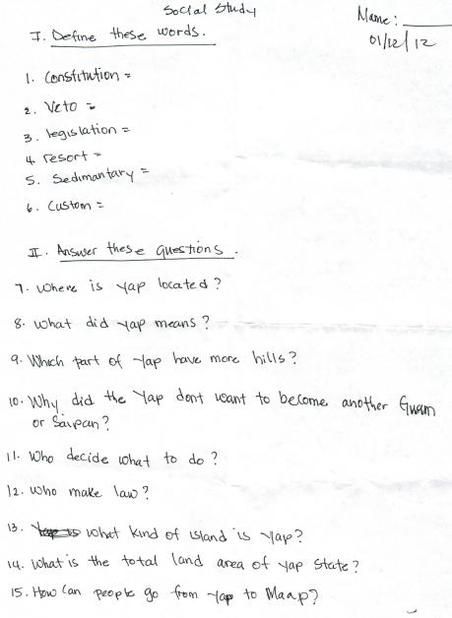 Worksheet found in one of our adopted schools _ When not working, I have been doing a lot of job searching over the past few months looking at what I am going to do post-Pohnpei. Throughout my research I have been astounded at the incredible number of non-profit organizations that exist. There are literally thousands and so many of them are doing the exact same thing. I believe this is the case for many reasons, but I think a main one is because it is exciting and commendable to start something new. While there are obviously many non-profits that do great work, I can’t help but wonder how many of these organizations started off with lots of momentum and slowly faded away when things got tough. It’s easy to start a new program or initiative and to set goals. While most of us have never started a non-profit organization, most of us have set goals, including resolutions a couple months ago. When we share our goals we can make ourselves sound quite accomplished and respectable. As my favorite author Donald Miller brought to my attention, we shouldn’t share our goals. As Miller writes, studies have shown that “when you share a goal publicly, your brain enjoys the sharing in the same way it enjoys the achievement itself, and you’ve lost some of your motivation.” Instead, we should focus on the work rather than any positive publicity from the admirable work we are doing. We should be proud of what we accomplish, not what we say we will accomplish. Ultimately, the strength of MAHI International’s work here in Pohnpei rests on its mission. Specifically with our education program, we are addressing a desperate need. As long as we continue to be blessed with the resources to execute this work, we will continue to persist in our efforts. Like everything on Pohnpei, our progress is slow. In many ways, living in Pohnpei is like living in a different world. It’s not anything new to acknowledge that the modern world is run by instant gratification, with people constantly distracted by the beeps and buzzes of technology. I remember going on a run to Red Square on Georgetown’s campus when I was interning in Washington, DC and stopping for a few minutes to witness how many people were on their cell phone. I ended up staying 20 minutes and literally saw every single person, well over 50 individuals, all talking or texting on their cell phone. It has been challenging to adjust to the slow pace on island, including living without a cell phone. Education reform on any level, anywhere in the world, is incredibly difficult and takes time. The fact that we are seeking to reform the education system on Pohnpei only exacerbates this fact. Despite the ever-present obstacles, I’m learning that only those individuals and organizations that diligently stay the course hold the opportunity to create positive and lasting change.
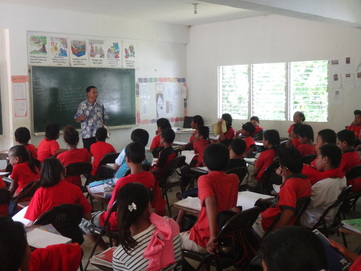 Mr. B teaching at Pohnlangas Elementary School _ When I think of the word “policy” in a government context, I naturally think of government red tape amidst a giant world of bureaucracy that hinders any forward progress. After spending four years in college studying political institutions and the principles and conduct of government, including spending eight months interning in Washington, DC, I have become somewhat jaded and weary of bureaucracy. While this frustration with “the establishment” is understandable, I have been constantly reminded that despite the sometimes perceived barriers bureaucracy can impose, there is a momentous need for strong and sound policy. Without being too brash, many of policies here in Pohnpei just plain stink, which is of little significance as the existing policies are hardly ever enforced. One policy in particular demonstrates the remarkable need for reform. Students here are not taught in English until 4th grade. However, when they enter 4th grade they are handed the same 4th grade Math, Science and English textbooks given to their counterparts who are the same age in America. Unless a child has been raised in an English-speaking household in Pohnpei, which I doubt exists, this student is expected to go from knowing hardly any English to reading at a 4th grade level overnight. It simply makes no logical sense. The argument goes that the locals don’t want to lose their local language by teaching in English beginning in 1st grade. This is an understandable and valid point. I would counter however that in many places throughout the world, students are learning in both their native tongue and English from the beginning of their education, becoming proficient in both languages. Put yourself in the shoes of that 4th grade student handed a 4th grade Science textbook. It might as well be written in hieroglyphics. Progress is made, but at a very slow pace. I have learned the importance of a student’s “instructional reading level.” If a student who is reading at a 1st grade level is handed a 4th grade textbook, he/she is going to become quickly frustrated and discouraged. This inevitably leads to a student not wanting to learn and likely having a negative approach to education for the rest of their life. If that same student is handed a 1st grade level book though, he/she will make progress and move up to the next reading level. This information is critical and explains why we spent two months assessing and compiling each student’s instructional reading level. So from the very beginning, each student is already starting three grades behind. Despite this being a horrible policy, I wish it was enforced. The fact is after traveling to and assessing dozens of 6th, 7th and 8th grade classrooms throughout Pohnpei, I have only witnessed one classroom being taught in English. Even English lessons are being taught in Pohnpeian. When I first discovered the “starting out three years behind” phenomenon, I instinctively thought we should petition for a policy change so students would start being taught in English in 1st grade. After visiting so many classrooms though, with no enforcement of the current policy whatsoever, I realized that would be a gigantic waste of time. Let’s recap: students in Pohnpei don’t start learning in English until 4th grade and are, except in rare circumstances, never actually taught in English, from what I have witnessed through the 8th grade level. I hate to say this, but it gets worse. Much, much worse. I’m going to save for my next post what I believe to be the largest obstacle for education reform in Pohnpei. This is just one policy that matters among many here in Pohnpei. It has become obvious to me throughout this experience that the environment in which a student learns is just as important, if not more so, than a student’s innate abilities and commitment to learning. Just look at that student receiving that 4th grade level textbook. He’s not dumb. He’s a product of a failed system. On a lighter note, this weekend a few of us had a nice short hike up a little mountain that is lovingly called “Chickenshit.” I forgot to mention in my Nan Madol post one legend of how Nan Madol was built. The story goes that chickens carried the large columnar basalt rocks across the island. Apparently, these chicken “relieved themselves” on this part of the island. The little mountain is coned shape, and I can see how the locals could see how it looks like…well, ya know. Pictures below! Lastly, this is my most recent post since my Giants were victorious in Super Bowl XLVI! Here are some glorious highlights of the epic game!
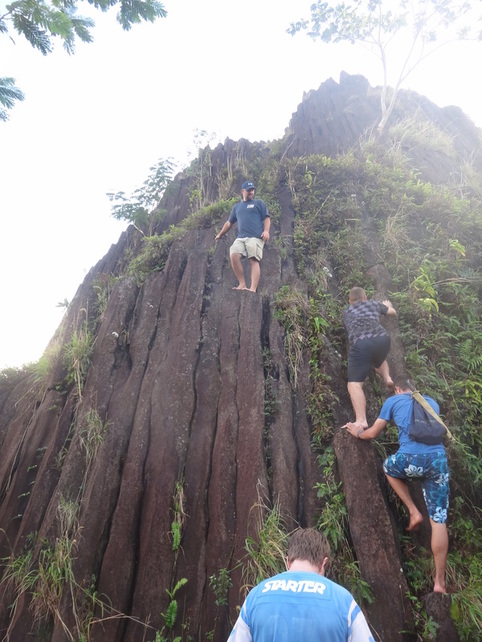 Climbing up Chickenshit. Nope, that wasn't a type-o.  Panorama from atop Chickenshit 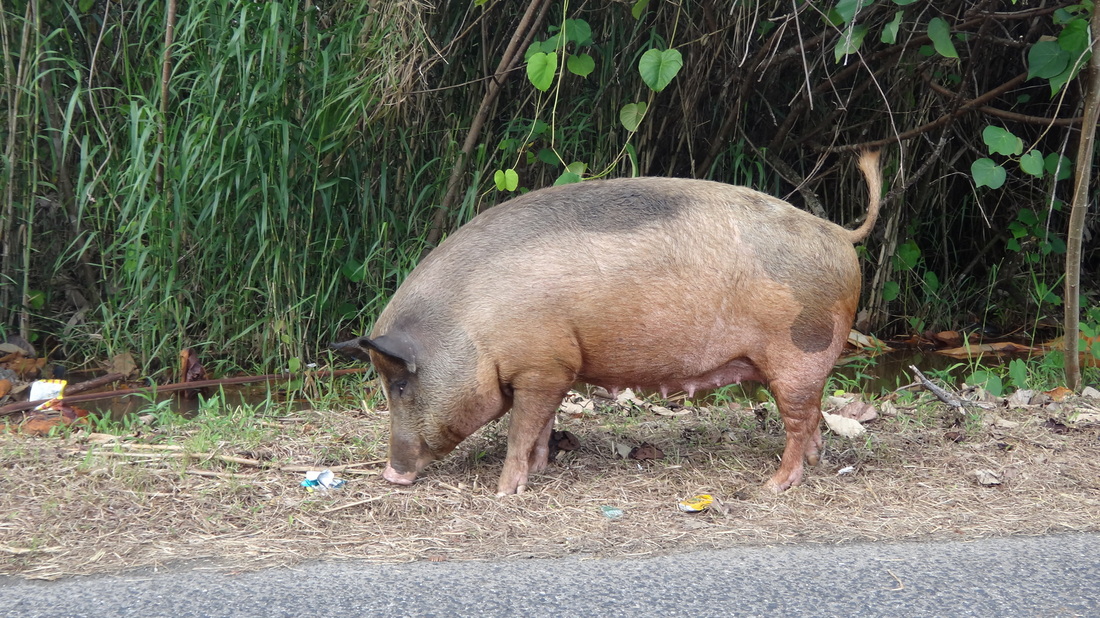 Gigantic pig I saw on the side of the road today in Madolenihmw _
The opinions expressed in this blog are solely those of Drew Robinson.
|

